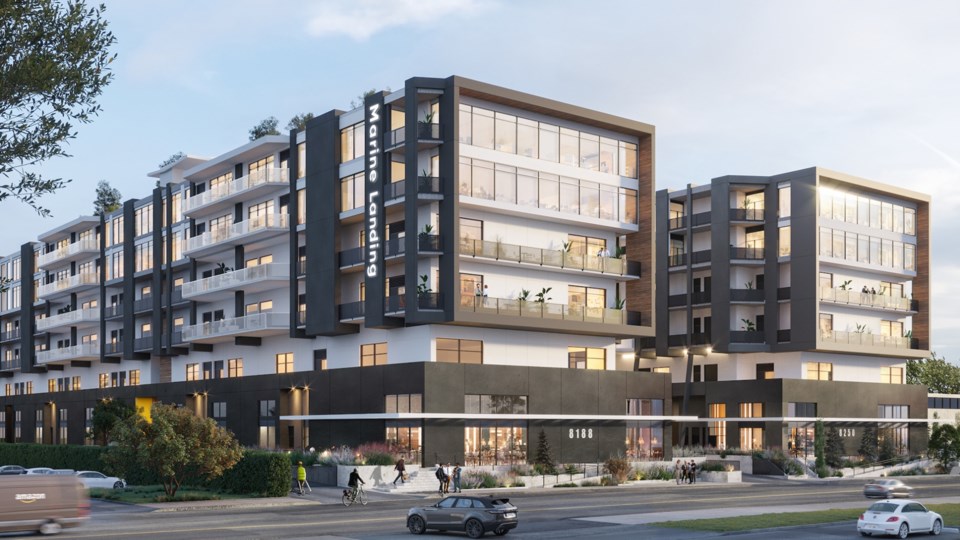The odds are stacked in favour of mixed-use jobs space, according to the developer of an innovative project in South Vancouver.
Billed as the largest stacked industrial-office project in Canada, Marine Landing is welcoming its first occupants at the end of December.
Many of the 102 businesses in the first phase were attracted by changes to the city’s I-2 zoning to allow a greater range of office uses in industrial-office projects, adding medical, dental, legal, accounting, real estate, insurance and other businesses. The change allowed Marine Landing to add 120,000 square feet of office space on the top two floors, with four levels of light industrial below. The project offers a total of 340,000 square feet across 242 light industrial and office units.
“We’ve got some dental businesses, we’ve got a chiropractor, physiotherapist, accounting firm,” said Lilian Arishenkoff, senior vice-president with Wesbild Holdings Ltd., which is developing the project in partnership with KingSett Capital. “People have bought into the project as a result of [zoning] changes the city of Vancouver has made.”
The vertical structure also allows for more interaction between occupants than in a traditional ground-oriented business park.
“We have a lot of complementary users,” Arishenkoff said. “If someone has a warehousing business, their accountant can be there, their legal office.”
While sales aren’t at the feverish pace the market experienced in 2021-2022, the additional density has allowed competitive pricing that’s ensured steady deal flow. The industrial units are selling for $739 a square foot, while office space is averaging $965 a square foot.
“Increasing the supply allows you to have more affordable spaces to purchase,” Arishenkoff said. “[Rather] than just getting a horizontal spread of industrial space, they can buy into a project and flourish, and be in charge of their own future.”
Approximately 95 per cent of sales to date have been to Metro Vancouver businesses. The first phase is 80 per cent sold while the second phase, which completes in March, is about a third sold.
With interest rates falling and units open for tours, sales could pick up later this year.
“There’s a lot of interest,” Arishenkoff said.
While sales activity has been slow, demand has seen prices hold steady. With vacancies in the region still at historically low levels, strata buyers and tenants have relatively few options in a market that’s traditionally been one of the tightest in North America.
Strata industrial projects by developers Cedar Coast and PC Urban underscore the current dynamic in the market.
Marine+Boundary by Cedar Coast will deliver 111,047 square feet of light industrial space to the Burnaby-South Vancouver market in 2026, with current pricing running upwards of $740 per square foot.
PC Urban has seen even stronger pricing in Coquitlam, where its Eagle Ridge project on Barnett Hwy. is averaging $751 per square foot. A project in Vancouver’s Southlands neighbourhood is commanding $832 per square foot.
“To get those types of prices right now, to me, is shocking,” said Cory Wright, managing director, B.C., with William Wright Commercial. “They probably don’t have the sales to speak of, but they really haven’t come off the asking rates.”
It makes a shift in buyer sentiment, he said, signalling renewed willingness to invest in space after two years of high interest rates.
“The Bank [of Canada] took a big step,” said Aaron Fedora, vice-president of development at Cedar Coast, referencing last week's 50-basis point cut to the central bank’s policy rate. “That’s going to make things more affordable for small businesses, and we see that as a positive impact on their ability to expand their capacity.”
Marine+Boundary has 32 small-bay units. The project has five firm deals in place and two units under contract, making it one of Cedar Coast’s most active projects.
Cedar Coast is also developing industrial space in Richmond, Surrey, Langley, Abbotsford and Mission, as well as Kamloops.



